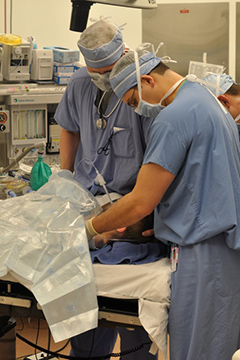 The Pediatric Anesthesiology Fellowship at UPMC Children's Hospital of Pittsburgh is designed to further develop clinical expertise in caring for neonates, infants, children, and adolescents undergoing a wide variety of surgical, diagnostic, and therapeutic procedures. There are approximately 30,000 anesthetics performed yearly at the Children’s Hospital of Pittsburgh sites. It is among the oldest and most successful fellowships of its kind in the country and it is one of the first Pediatric Anesthesiology Fellowships to receive ACGME accreditation. Nine one-year positions are available each year.
The Pediatric Anesthesiology Fellowship at UPMC Children's Hospital of Pittsburgh is designed to further develop clinical expertise in caring for neonates, infants, children, and adolescents undergoing a wide variety of surgical, diagnostic, and therapeutic procedures. There are approximately 30,000 anesthetics performed yearly at the Children’s Hospital of Pittsburgh sites. It is among the oldest and most successful fellowships of its kind in the country and it is one of the first Pediatric Anesthesiology Fellowships to receive ACGME accreditation. Nine one-year positions are available each year.
- Virtual Tour: UPMC Children's Hospital of Pittsburgh
- Watch our virtual fellowship tour videos to meet some of our fellows and hear what they have to say about the program, as well as learn more about the rotations and the fellowship work environment.
Clinical Experience
In addition to the routine pediatric surgical patients, the Pediatric Anesthesiology Fellow will be expected to master the anesthetic care of complicated pediatric patients undergoing repair of orthopedic, neurologic, urologic, plastic, and general surgical pathologies. The fellow will also be exposed to pediatric patients with organ failure undergoing transplantation and non-transplantation procedures. The Pediatric Anesthesiology Fellow will develop expertise in critical perioperative pediatric care, pediatric advanced life support, invasive monitoring, and pediatric pain management during subspecialty rotations on the Acute Pain Medicine Service, Congenital Cardiac Service, and The Cardiac Intensive Care Unit.
UPMC Children's Hospital of Pittsburgh is a Level 1 Trauma Center. Fellows will be involved in emergency room and intraoperative management of the pediatric trauma patient. Specifically, the Pediatric Anesthesiology Fellow will understand the airway management needs of such patients, as well as gain familiarity with resuscitation of pediatric trauma patients.
Educational Program
The fellow will acquire a comprehensive understanding of the developmental, pharmacological, anatomic, physiologic, and psychological changes that occur with age and disease. The didactic component of the Pediatric Anesthesiology Fellowship program consists of lectures, seminars, departmental conferences, and bedside teaching. The lecture series consists of daily 30-minute morning conferences. In addition to these morning conferences, a weekly seminar is held to further explore topics in pediatric anesthesiology. These seminars are one hour in duration and are conducted by faculty from the anesthesiology, pediatric, and surgery departments. There is also a monthly morbidity and mortality conference.
Application Process
Anesthesiology residents interested in the Pediatric Anesthesiology Fellowship are encouraged to apply. The qualifications for the Pediatric Anesthesiology Fellowship Program are that the applicant will have completed an AGCME-Accredited Anesthesiology Residency Program by the start of the fellowship. Upon completion of an application and interview, fellows will be selected and ranked by a review committee. A minimum of three letters of recommendation one from the Residency Program Director is required for this program. This program participates in the San Francisco (SF) Match. Please register, complete the application, and submit the following documents for a complete application.
Application materials:
- Personal statement
- Three letters of recommendation (one must be from the anesthesiology program director)
- Medical school transcript
- Medical school dean's letter
- Most recent ABA In-Training exam score and ABA Basic Exam Letter and or board certification
- USMLE/COMLEX Steps 1, 2, and 3
- CV
- ECFMG certificate if applicable
Selection Timeline
- Applicant registration begins January 2026.
- Interviews will be held February 2026 – June 2026.
- There is a rolling application process through SF Match and applications will be reviewed once all required materials have been received.

